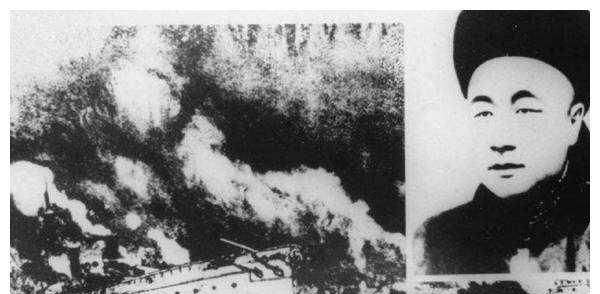Japan's gamble
In the Sino-Japanese Sino-Japanese War, little Japanese children fought a war with our Qing government that gambled on the fortunes of the country, and the poor military expenses given by the corrupt Qing government did not win this war by destroying the entire army of the Beiyang Marine Division, and in the end Japan won a happy gamble, and the Qing government sent Li Hongzhang to Japan to sign the "Maguan Treaty" and pay compensation for the land.
The victory in this war made the ambitions of the Japanese swell, and the rapid development of reparations was used to make Japan taste the sweetness of resolving internal contradictions in the country by war, and it was out of control from then on.

Inflated Japan still has some capital, they rely on the indemnities obtained in the Sino-Japanese War, develop their own military strength, after the preparation, Japan shocked the world's decision, and Russia to compete for the interests of the Qing Dynasty territory, this Russo-Japanese war, in the eyes of the world is incredible, everyone thinks that the Japanese will be beaten by the Russian Han on the ground, but the result is surprising, Russia was unexpectedly defeated by Japan, at this time, the world's powers found that Japan at this time can not be underestimated, It has become the strongest fighting force in Asia.
Crazy Japanese invaders in World War II
With the rise of Japan after the Meiji Restoration, Japan developed rapidly, using the reparations obtained from the war and the cession of land, quickly supplemented the shortcomings of Japan's insufficient resources, so that Japan's development and upgrading rapidly, under the impetus of militarist ideas, the Japanese launched the September 18 Incident in 1931, which also marked the beginning of the Japanese all-round war of aggression against China.
As Japan's ambitions continued to expand, they actually tried to occupy the whole territory of China within three months, of course, this is an impossible goal, under the unanimous resistance of the Chinese military and people, Japan's aggressive pace in China was stopped, with the development of the war that has lasted for a long time, the contradictions in Japan have gradually become prominent, at the same time, the shortcomings of Japan's lack of resources have once again been revealed, and the strategy of feeding the war with war has begun to lose its meaning.
At this time, Japan was riding a tiger, the militarist road could only go to the end, the defeat in the Pacific theater, so that Japan gradually weakened, in the corner, Japan still did not want to repent, chose to sneak attack the United States Pearl Harbor, in order to supplement resources with war, at the same time, Japan attacked the United States and the Philippines, captured more than 80,000 people, including many Americans, such behavior, let the United States extremely angry, and finally participated in World War II, as soon as they heard the news, Germany was about to cry.
With the United States entering the war, Japan began to lose and retreat, after the Soviet Union took over Germany, the steel torrent began to impact the Japanese Kwantung Army, at this time the Japanese Kwantung Army is not an elite, are some recruits and old and weak, simply can not stop the impact of the Soviets, captured 600,000 people, all put in Siberia to work, Siberia that place can be cold, plus labor, the mortality rate is very high, of course, this is also Japan's self-inflicted guilt, deserved.
Japan is delusional about a "local decisive battle"
Even under such circumstances, Japan did not surrender, and they formulated a policy of "one hundred million jade fragments" and wanted to fight a final decisive battle with the Soviet Union and the United States on the mainland.
Of course, the Americans did not want to land in Japan as cannon fodder, the Soviets did not want to be cannon fodder, and finally the United States decided to throw an atomic bomb to Japan to taste, so there was a loud noise, Japan's Hiroshima blossomed, after a mushroom cloud, the pillar of fire in the sky continued, so that Hiroshima City fell into the sea of fire.
The Japanese were still reluctant to surrender, and after their expert inspection, although they were surprised, they thought that the United States did not have many atomic bombs of such power, so the Japanese continued to implement the "Jade Crush" plan and prepare for a decisive battle on the mainland, however, the United States began to distribute leaflets to inform the people of Nagasaki to evacuate, and the Japanese thought that this was an American tactic, so they printed newspapers to reassure the people of Nagasaki that they did not have to evacuate.
Because the people of Nagasaki had received too many leaflets from the US bombing before, they had become accustomed to it, so they thought that this time it was nothing, and coupled with the propaganda of the Japanese government, the people of Nagasaki did not evacuate. With the appearance of a mushroom cloud, Nagasaki followed in Hiroshima's footsteps and became a ruin after the smoke of war.
In the face of such a powerful atomic bomb, the Japanese emperor was also a little afraid, and the Japanese government suddenly found that the United States did not seem to be bluffing, and their so-called "jade fragments" also became a "joke", after all, under the attack of the atomic bomb, they could not see the enemy at all, let alone any "jade fragments", and in the end, the Japanese emperor chose to surrender.
When Japan surrendered, Japan still had more than 7 million troops, but it was meaningless, in the face of the joint encirclement and suppression of many countries, coupled with the dropping of the American atomic bomb, if Japan continued to resist, it would eventually end up with the destruction of the country.